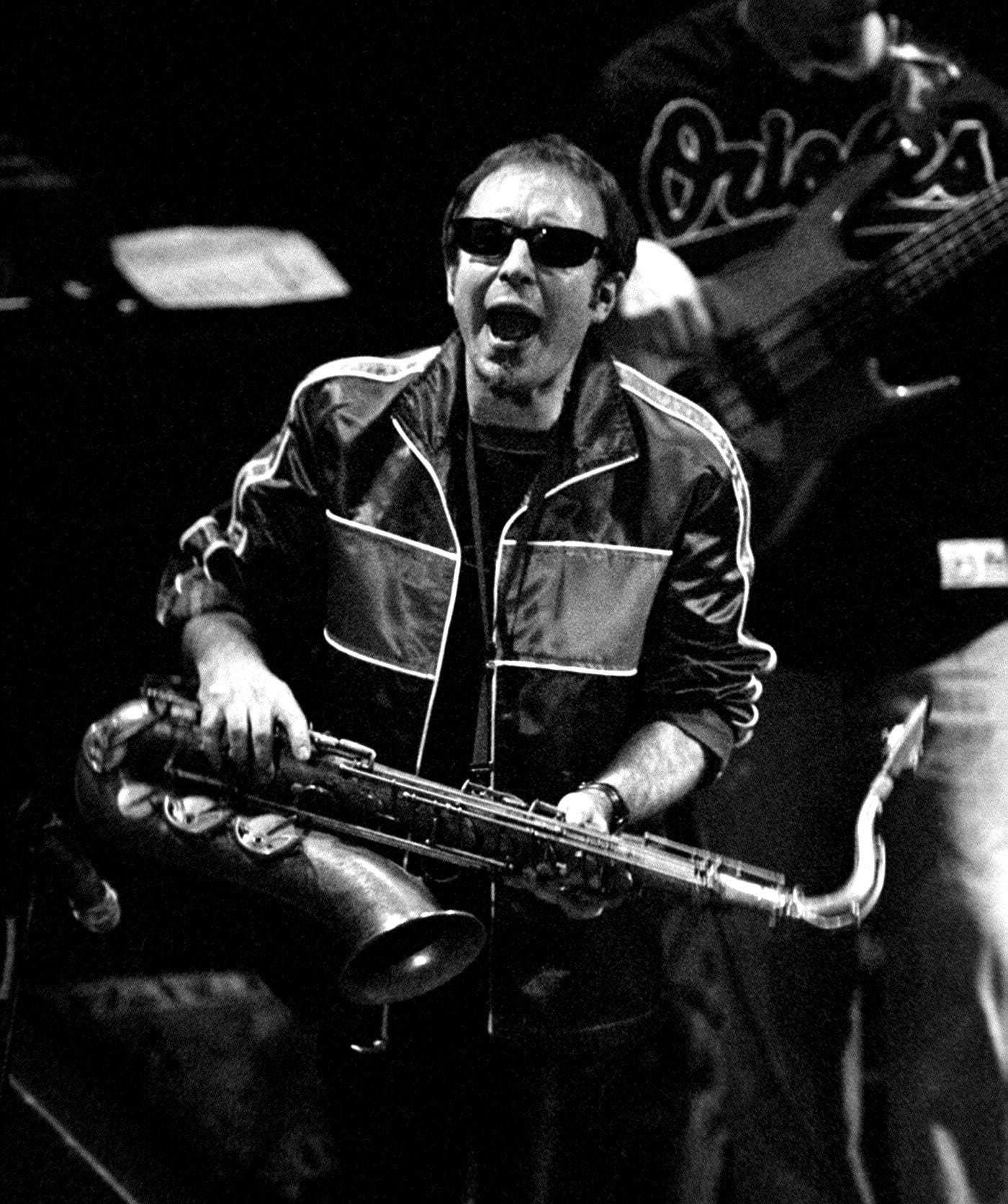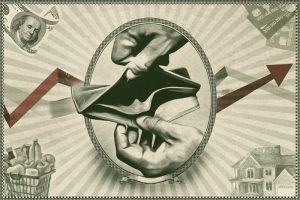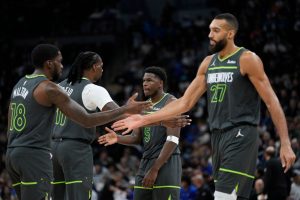
Mars Williams, free-jazz musician and saxophonist for the Psychedelic Furs, dies at 68
When the Chicago Reader declared in 1997 that audiences “won’t find a busier saxophonist in Chicago than Mars Williams,” more evergreen words were scarcely written.
Even in his 60s, Williams remained an omnipresent, indefatigable musical presence in this city and beyond. His live-wire sax sound expanded to fill the space it was in, whether a DIY hole-in-the-wall or a teeming arena concert with the Psychedelic Furs, with whom he toured as recently as last month.
“I don’t know anyone else who’s able to go one night from playing a rock concert in front of 5,000 people to playing at the Beat Kitchen in front of 10, and taking both contexts absolutely seriously,” saxophonist Dave Rempis told the Tribune recently. “It’s not even rare; it’s unheard of to move back and forth between all the worlds that he does.”
Williams died Nov. 20 from ampullary cancer, a rare cancer affecting the area around the small intestine, after being diagnosed almost a year ago. He was 68. His death was confirmed to the Tribune by his brother Paul Williams.
One of six children, Williams was born in Elmhurst on May 29, 1955, and grew up in nearby Franklin Park. Then “Marc,” Williams was a star clarinetist in his school music program. But a summer spent playing in a cover band put him off the classical training he’d committed to at DePaul University. Instead, he immersed himself in the far-out sounds of the Association for the Advancement of Creative Musicians, the seminal South Side musical collective, and eventually counted two of its members — Anthony Braxton and Roscoe Mitchell — as mentors.
After a formative jaunt out west to Colorado, Williams made his way to New York City in the late 1970s, making money as a bike messenger and trying to break into the live music scene. By then, Williams went by “Mars,” inspired by his baby brother’s attempts to pronounce his name. There, he met his heroes Ornette Coleman and Don Cherry and caught the ear of downtown luminaries like John Zorn.
“Mars Williams is one of the true saxophone players — someone who takes pleasure in the sheer act of blowing the horn and there are not many saxophone players I can truthfully say this about,” Zorn wrote in the liner notes to “Eftsoons,” Williams’ 1984 duo album with multi-instrumentalist Hal Russell.
Williams also kick-started his parallel career in the rock world in New York, playing punk shows at the music club CBGB and picking up gigs by word-of-mouth. That path eventually led him to the Psychedelic Furs, becoming the band’s longest-serving member after founders Richard and Tim Butler. He played with the Furs from 1983 to 1989, then again from 2005 to the present.
Guitarist Rich Good, who joined the Furs in the aughts, praised Williams’ subtly radical twists on familiar solos, even on songs he didn’t record with the band.
“He never steps away from what the theme of the song is, but he transcends it, takes it to the next level,” Good says. “The audience is kind of gobsmacked when they see this stuff happen.”
As is the sideman’s lot, Williams was never a household name, though many of the acts he performed with are: Billy Idol, The Killers, Ministry, Dirty Projectors and Jerry Garcia, to name a few. As a core member of short-lived hit magnets The Waitresses, Williams ripped all over that band’s most enduring tunes, like “Christmas Wrapping” and “I Know What Boys Like.”
But in the niche realm of experimental free jazz, Williams was a musicians’ musician. A sampling of the projects he either led or founded includes the NRG Ensemble, the legendary improvising unit founded by Russell; Extraordinary Popular Delusions, quite likely the longest-running free jazz act in the city; Witches & Devils, a tribute to saxophonist Albert Ayler; and the Chicago Reed Quartet. He toured internationally with all of these, as well as with lauded free jazz groups run by fellow saxophonists Peter Brötzmann (Brötzmann Tentet) and Ken Vandermark (the Vandermark Five).
That’s not to say Williams corralled the many genres he explored — far from it. His rap-meets-jazz-meets-funk group Liquid Soul surfed the acid jazz crest of the ‘90s to Grammy acclaim; the band played Bill Clinton’s second inauguration and became a favorite of the Chicago Bulls. In XMARSX, another project, Williams collaborated with MC5 guitarist Wayne Kramer. Yet another Williams brainchild, Sonic Soul Sirkus, combined brassy, wide-swinging jazz, hip-hop beats, aerial acrobats, and, per his website, “a performing pit bull.”
“I’m embarrassed to say, at one point I had this Art Ensemble percussion set-up with the Waitresses, full of stuff I made and Tibetan monk horn solos,” Williams told the Tribune.
Sober for nearly two decades, Williams offered guidance and support to other musicians living with addiction. Celebrated trumpeter jaimie branch, who died last year, once credited Williams with getting her clean. Even as his rounds of radiation intensified, Williams refused painkillers, fearing another relapse.
“I’m always available — people know that. I don’t have to go around saying I’m sober. A lot of people in the industry know, and I’ll get a call,” he said.
Last June, Rempis started a GoFundMe to assist with Williams’ medical costs. It exceeded its $100,000 goal by a wide margin — just one measure of the love with which Williams was showered by audiences around the globe.
Proceeds from an upcoming Nov. 25 benefit show at Metro, headlined by colleagues from all walks of Williams’ venturesome musical life, were intended to go toward Williams’ treatment fund.
Instead, it will celebrate his life, and the music he filled every square inch of it with.
“It’s so infectious, Mars’s love of playing, in every sense of that word,” says guitarist Steve Marquette, who played and toured with Williams in several configurations. “Sometimes, the academically rigorous language that gets used around this music takes a front seat to that joy of making sound. But Mars’s music is never about pushing people away. It’s a pure and honest form of expression.”
Hannah Edgar is a freelance writer.
“Music for Mars,” featuring Liquid Soul, the Joe Marcinek Band and Jesse De La Peña, with special guests Richard Butler, Zachary Alford and Rich Good of Psychedelic Furs, Jeff Coffin of Dave Matthews Band, Richard Fortus of Guns N’ Roses and Ike Reilly, is 8 p.m. Nov. 25 at Metro, 3730 N. Clark St., tickets $35 at door, $30 advance, $150 table for two, metrochicago.com
()


